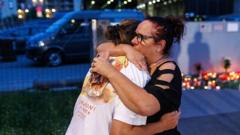In the early hours of Tuesday, a secondary school in Graz became the site of Austria's deadliest mass shooting as a 21-year-old man opened fire, killing nine individuals before turning the gun on himself. The tragic event also left twelve others injured, with one succumbing to their wounds later in the day. The nation has declared a three-day mourning period as authorities piece together the motives behind this shocking act of violence.
Witnesses report that the first shots rang out around 10:00 AM local time, catching students off guard. A 17-year-old described the confusion, initially dismissing the sound as construction noise. Another student recounted how their teacher acted swiftly to secure the classroom. Local residents reported hearing multiple gunshots, and at one point, a student seemed ready to escape a window before retreating back inside.
Law enforcement swiftly responded, containing the situation within 17 minutes, deploying over 300 officers, including tactical teams. As the tragedy unfolded, it became evident that the gunman, a former student who did not graduate from Dreierschützengasse school, had taken his life in a school bathroom shortly after the attack.
Among the casualties were six females and three males, most of whom were students. One local resident expressed her heartbreak upon learning that a young boy she had known was among the deceased, calling the day "completely awful" for the country as a whole.
The shooter was identified as a resident from the Graz region, and investigators have uncovered a farewell letter and a non-functional pipe bomb at his residence. Officials confirmed that he legally owned the firearms used in the incident, prompting discussions on Austria's gun laws, which allow private ownership under strict regulations.
Austria is not typically known for such violent incidents; school shootings have been rare, with only a handful of minor cases in recent years, making Tuesday's event all the more shocking. A journalist noted the community's perspective, stating, "We are not living in America; we are living in Austria, which seems like a very safe space."
As the nation mourns, this tragic event raises critical questions about safety, mental health support, and the need for potential reforms in gun laws as Austrians come together to support one another in the face of this unimaginable loss.
Witnesses report that the first shots rang out around 10:00 AM local time, catching students off guard. A 17-year-old described the confusion, initially dismissing the sound as construction noise. Another student recounted how their teacher acted swiftly to secure the classroom. Local residents reported hearing multiple gunshots, and at one point, a student seemed ready to escape a window before retreating back inside.
Law enforcement swiftly responded, containing the situation within 17 minutes, deploying over 300 officers, including tactical teams. As the tragedy unfolded, it became evident that the gunman, a former student who did not graduate from Dreierschützengasse school, had taken his life in a school bathroom shortly after the attack.
Among the casualties were six females and three males, most of whom were students. One local resident expressed her heartbreak upon learning that a young boy she had known was among the deceased, calling the day "completely awful" for the country as a whole.
The shooter was identified as a resident from the Graz region, and investigators have uncovered a farewell letter and a non-functional pipe bomb at his residence. Officials confirmed that he legally owned the firearms used in the incident, prompting discussions on Austria's gun laws, which allow private ownership under strict regulations.
Austria is not typically known for such violent incidents; school shootings have been rare, with only a handful of minor cases in recent years, making Tuesday's event all the more shocking. A journalist noted the community's perspective, stating, "We are not living in America; we are living in Austria, which seems like a very safe space."
As the nation mourns, this tragic event raises critical questions about safety, mental health support, and the need for potential reforms in gun laws as Austrians come together to support one another in the face of this unimaginable loss.



















